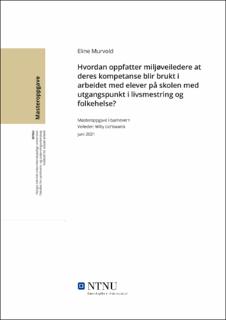| dc.contributor.advisor | Lichtwarck, Willy | |
| dc.contributor.author | Murvold, Eline | |
| dc.date.accessioned | 2021-10-03T16:42:38Z | |
| dc.date.available | 2021-10-03T16:42:38Z | |
| dc.date.issued | 2021 | |
| dc.identifier | no.ntnu:inspera:77809456:17275581 | |
| dc.identifier.uri | https://hdl.handle.net/11250/2787284 | |
| dc.description.abstract | Formålet med denne masteroppgaven er å se på hvordan miljøveiledere ansatt på skole føler at deres kompetanse blir utnyttet, spesielt opp mot det tverrfaglige temaet livsmestring og folkehelse, men også på generell plan. Jeg ønsket å få ta i miljøveilederes tanker og oppfatninger om hva som fungerer og hva som eventuelt ikke fungerer når det kommer til utnyttelse av kompetanse. Med dette som utgangspunkt ble problemstillingen; "Hvordan oppfatter miljøveiledere at deres kompetanse blir brukt i arbeid med elever på skolen med utgangspunkt i livsmestring og folkehelse?»
Dette er en kvalitativ studie og jeg har benyttet meg av semistrukturerte intervju i datainnsamlingen. Jeg intervjuet fire miljøveiledere og en rådgiver. Jeg har benyttet meg av et fenomenologisk hermeneutisk ståsted i analyseringen av datamaterialet. Funnene blir analysert under fire hovedkategorier; Samarbeid, Viktigheten av et fungerende system, Kompetanseutnyttelse og Konflikt mellom det faglige og det sosiale.
Analysen viser at samarbeid er noe informantene ser på som svært viktig for å få utnyttet sin kompetanse i skolen, både på generell basis og opp mot livsmestring og folkehelse. I samarbeid ligger det blant muligheter for tverrfaglig samarbeid, som kan føre til et helhetsperspektiv på utfordringene elevene møter i dagens samfunn og skoleliv. Til tross for dette ser det ut til at et godt samarbeid er vanskelig å realisere. Informantene opplever store utfordringer knyttet til samarbeid, og ser på det som lite prioritert. Noen av utfordringene er blant annet knyttet til uklare roller og mangel i kommunikasjon.
Informantene opplever at en forankring i system og ledelse kan være med å fremme et godt samarbeid, som igjen kan bedre utnyttelsen av deres kompetanse. Det oppleves som tilfeldig om rektor på skolen prioriterer samarbeid på arbeidsplassen, og hvordan rektor utnytter skolens ressurser. Flere av informantene opplevde mangel på kompetanseutnyttelse, både opp mot livsmestring og folkehelse, og generelt. Mine funn viser en tendens til en profesjonsstrid mellom miljøveiledere og lærere. For lite kunnskap om hverandre og mangel på anerkjennelse av kompetanse ble trukket frem som noen mulige årsaker.
Funnene viser at det faglige og sosiale på skolen, kan oppfattes som motstridende, og det kan dermed oppstå en konflikt mellom disse. Informantene opplever at det er mer fokus på det faglige sammenlignet med det sosiale. Dagens samfunn krever gode sosiale ferdigheter, og sosial læring må derfor ses på som viktig i skolen. Det faglige og sosiale må ses på som en helhet, og ikke som to deler som det arbeides med hver for seg. | |
| dc.description.abstract | The purpose of this study is to look at how social workes working in schools feel that their competence gets utilized, especially towards the interdisciplinary theme of life skills and public health, but also at a general level. I wanted to get into the social workers thoughts and perceptions about what works and what may not work when it comes to the utilization of competence. With this as a starting point, the issue became; "How do social workers perceive that their competence is used in work with pupils at school, based on life skills and public health?".
This is a qualitative study and I have used semi-structured interviews in the data collection. I interviewed four social workes and one counselor. I have used a phenomenological and hermeneutic standpoint when analysing the data material. The findings get analysed under four categories; cooperation, the importance of a functioning system, competence utilization and the conflict between learning the subjects and learning social skills.
The analysis shows that cooperation is something the informants see as very important to fully utilize their competence in school, both in general and up against the subject life skills and public health. Cooperation also includes, among other things, the opportunity of an interdisciplinary collaboration that could lead to an overall perspective on the challenges the pupils face in today's society and school life. Despite this, it seems that a good cooperation is difficult to realize. The informants experience major challenges related to this, and see it as a low priority. Some of the challenges are related to unclear roles and a lack of communication.
The informants experience that an anchoring in the system and leadership can help to promote good cooperation, which in turn can improve the utilization of their competence. It is perceived as a coincidence if the principal of the school prioritises cooperation, and how the principal utilizes the school's resources. Several of the informants experienced a lack of competence utilization, both towards life skills and public health, and in general.
My findings show a tendency of a professional dispute between the social workers and teachers. Too little knowledge about each other and a lack of recognition of competence were highlighted as some possible reasons.
The findings show that the focus on learning the subjects and learning social skills at schools, can be perceived as contradictory, and a conflict can thus arise. The informants experience that there are more focus on the pupils academic skills compared to the social skills. Today's society requires good social skills, and social learning must therefore be seen as important in school. The academic skills and the social skills must be seen as one whole part and not as two divided parts to be worked on separately. | |
| dc.language | nob | |
| dc.publisher | NTNU | |
| dc.title | Hvordan oppfatter miljøveiledere at deres kompetanse blir brukt i arbeid med elever på skolen med utgangspunkt i livsmestring og folkehelse? | |
| dc.type | Master thesis | |
